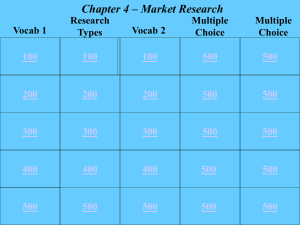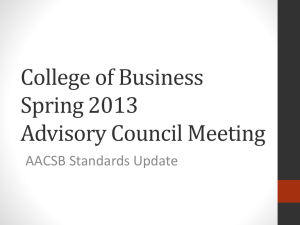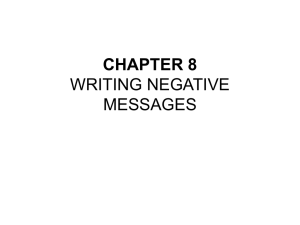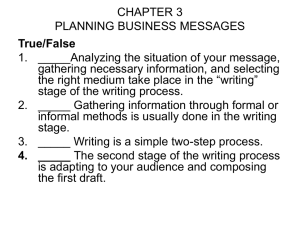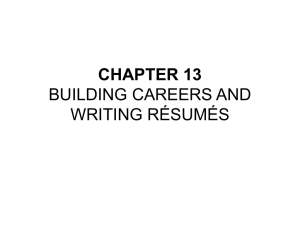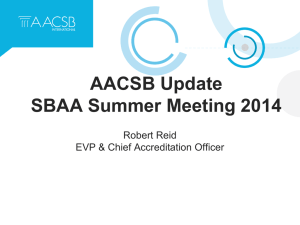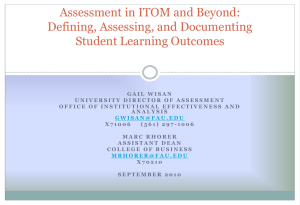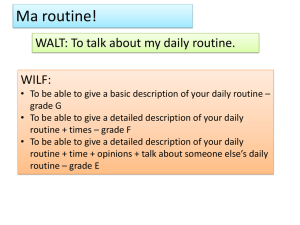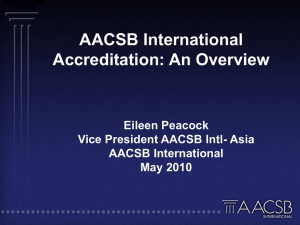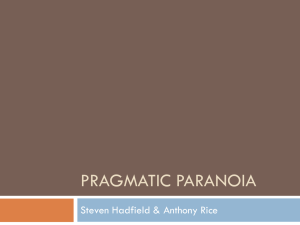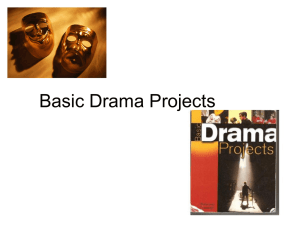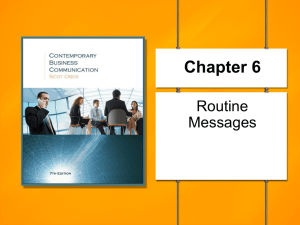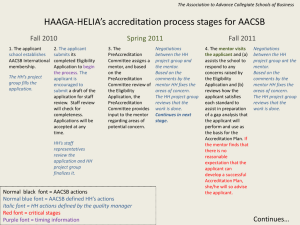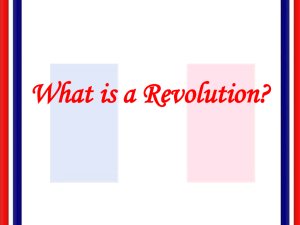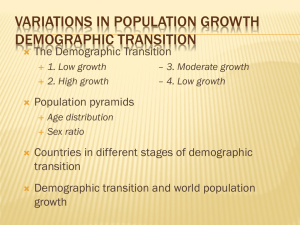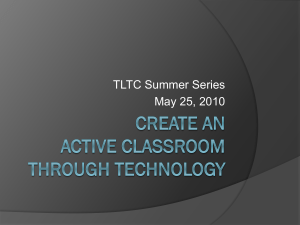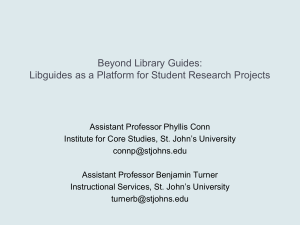chapter 6 crafting messages for electronic media
advertisement
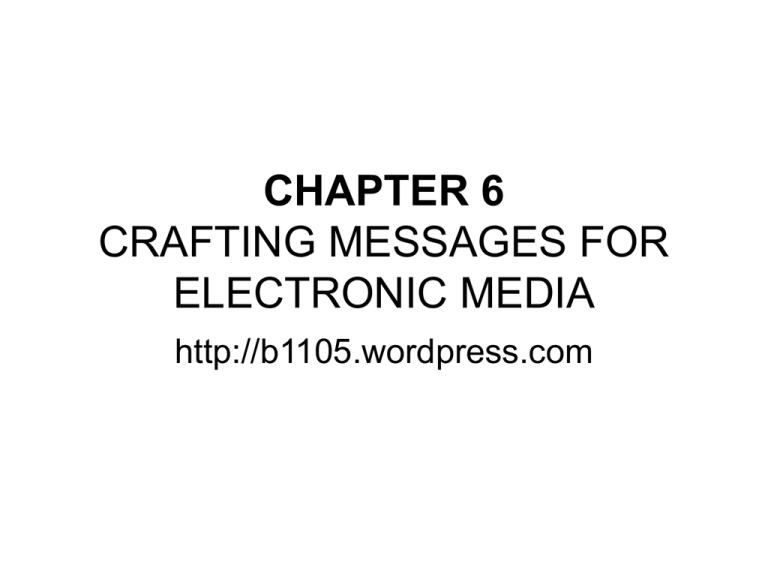
CHAPTER 6 CRAFTING MESSAGES FOR ELECTRONIC MEDIA http://b1105.wordpress.com • Multiple choice 1. Appropriate media for routine, internal communication include a. instant messaging. b. e-mail. c. letters. d. both a and b 2. One key reason e-mail is being replaced by instant messaging, blogging, and wikis is that: a. These other media provide better support for realtime collaboration. b. Few companies use e-mail anymore. c. E-mail is not available on mobile phones and other handheld devices. d. Top executives don’t have e-mail addresses. • Multiple choice 1. Appropriate media for routine, internal communication include a. b. c. d. instant messaging. e-mail. letters. both a and b • ANSWER: d. For routine, internal communication use instant messaging and e-mail. Letters are for more formal, external communication. • DIFFICULTY: moderate; PAGE: 116; OBJECTIVE: 1; TYPE: concept; AACSB: Communication 1. One key reason e-mail is being replaced by instant messaging, blogging, and wikis is that: a. b. c. d. • • These other media provide better support for real-time collaboration. Few companies use e-mail anymore. E-mail is not available on mobile phones and other handheld devices. Top executives don’t have e-mail addresses. ANSWER: a. Instant messaging, blogging, and wikis provide better support for real-time collaboration than e-mail can provide. DIFFICULTY: moderate; PAGE: 116; OBJECTIVE: 1; TYPE: concept; AACSB: Communication, Technology • True/False 1._____ E-mail is now a primary communication medium for most companies. 2._____ Social media such as YouTube are not useful in business. 3._____ Printed messages are the still the most formal media for business communication. • True/False 1. _____ E-mail is now a primary communication medium for most companies. • ANSWER: True. E-mail is now a primary communication medium for most companies. • DIFFICULTY: moderate; PAGE: 116; OBJECTIVE: 2; TYPE: concept; AACSB: Communication, Technology 1. _____ Social media such as YouTube are not useful in business. • ANSWER: False. The wide reach and interactivity of such media are changing the very nature of business communication. • DIFFICULTY: easy; PAGE: 117; OBJECTIVE: 1; TYPE: concept; AACSB: Communication, Technology 1. _____ Printed messages are the still the most formal media for business communication. • ANSWER: True. Printed messages are still best when you want to make a formal impression. • DIFFICULTY: easy; PAGE: 117; OBJECTIVE: 1; TYPE: concept; AACSB: Communication • Fill-in the Blank 1.For many companies, ______ has been replaced by instant messaging, blogging, wikis, and other tools. 2.A ______ is the online equivalent of recorded audio or video broadcasts. 3.E-mail ______ refers to all the efforts companies are making to keep e-mail clean and safe—from spam blocking and virus protection to content filtering. • Fill-in the Blank 1. For many companies, ______ has been replaced by instant messaging, blogging, wikis, and other tools. • ANSWER: E-mail • DIFFICULTY: easy; PAGE: 116; OBJECTIVE: 1; TYPE: concept; AACSB: Communication, Technology 1. A ______ is the online equivalent of recorded audio or video broadcasts. • ANSWER: Podcast • DIFFICULTY: moderate; PAGE: 117; OBJECTIVE: 5; TYPE: concept; AACSB: Communication, Technology 1. E-mail ______ refers to all the efforts companies are making to keep e-mail clean and safe—from spam blocking and virus protection to content filtering. • ANSWER: Hygiene • DIFFICULTY: moderate; PAGE: 118; OBJECTIVE: 2; TYPE: concept; AACSB: Communication, Technology • Short Answer/ Essay • List at least five media that are popular for sending short business messages. • ANSWER: Popular media for sending short business messages include: 1) E-mail, 2) Instant messaging (IM), 3) Text messaging, 4) Blogs, 5) Podcasts, and 6) Wikis. • DIFFICULTY: moderate; PAGES: 116–117; OBJECTIVE: 1; TYPE: concept; AACSB: Communication, Technology • Give three reasons to send a hard copy of a business message instead of using an electronic medium. • ANSWER: Reasons for sending a printed message include: 1) When you want to make a formal impression, 2) When you want to stand out from the flood of electronic messages your audience receives, and 3) When you are legally required to provide information in printed form. • DIFFICULTY: moderate; PAGE: 117; OBJECTIVE: 1; TYPE: concept; AACSB: Communication, Technology • CHAPTER 7 • WRITING ROUTINE AND POSITIVE MESSAGES 1. Finding out what readers need to know and having all of the relevant information is part of the ______ step of the writing process. a. b. c. d. completing organizing writing planning 2. The completing step includes a. b. c. d. organizing your message. revising your message. considering the customs of your audience. all of the above. 1. Finding out what readers need to know and having all of the relevant information is part of the ______ step of the writing process. a. b. c. d. completing organizing writing planning • ANSWER: d. These actions are part of the planning step. • DIFFICULTY: moderate; PAGE: 143; OBJECTIVE: 1; TYPE: concept; AACSB: Communication 1. The completing step includes a. b. c. d. organizing your message. revising your message. considering the customs of your audience. all of the above. • ANSWER: b. Revising is part of the completing step. The other two are part of the writing step. • DIFFICULTY: moderate; PAGE: 143; OBJECTIVE: 1; TYPE: concept; AACSB: Communication • True/False 1._____ Planning your message includes analyzing the situation and selecting an appropriate medium. 2._____When you make a routine request, you should anticipate that your audience will comply. 1._____ For routine requests you should use an indirect approach. • True/False 1. _____ Planning your message includes analyzing the situation and selecting an appropriate medium. • ANSWER: True. These are important parts of the planning step. • DIFFICULTY: easy; PAGE: 143; OBJECTIVE: 1; TYPE: concept; AACSB: Communication 1. _____When you make a routine request, you should anticipate that your audience will comply. • ANSWER: True. This is communication that is part of the normal course of business. • DIFFICULTY: moderate; PAGE: 145; OBJECTIVE: 2; TYPE: concept; AACSB: Communication 1. _____ For routine requests you should use an indirect approach. • ANSWER: False. Use a direct approach for routine requests. • DIFFICULTY: moderate; PAGE: 145; OBJECTIVE: 2; TYPE: concept; AACSB: Communication • True/False 1._____ Planning your message includes analyzing the situation and selecting an appropriate medium. 2._____When you make a routine request, you should anticipate that your audience will comply. 1._____ For routine requests you should use an indirect approach. • True/False 1. _____ Planning your message includes analyzing the situation and selecting an appropriate medium. • ANSWER: True. These are important parts of the planning step. • DIFFICULTY: easy; PAGE: 143; OBJECTIVE: 1; TYPE: concept; AACSB: Communication 1. _____When you make a routine request, you should anticipate that your audience will comply. • ANSWER: True. This is communication that is part of the normal course of business. • DIFFICULTY: moderate; PAGE: 145; OBJECTIVE: 2; TYPE: concept; AACSB: Communication 1. _____ For routine requests you should use an indirect approach. • ANSWER: False. Use a direct approach for routine requests. • DIFFICULTY: moderate; PAGE: 145; OBJECTIVE: 2; TYPE: concept; AACSB: Communication • Fill-in the Blank 1.The three-step writing process for routine messages includes ______, ______, and ______. 2.Adapting to your audience and maintaining a “you” attitude is part of the ______ step of the writing process for routine messages. 3.When making a routine request, you should use a/an ______ approach and open with a statement of your request. • Fill-in the Blank 1. The three-step writing process for routine messages includes ______, ______, and ______. • ANSWER: Planning; writing; completing • DIFFICULTY: moderate; PAGE: 143; OBJECTIVE: 1; TYPE: concept; AACSB: Communication 1. Adapting to your audience and maintaining a “you” attitude is part of the ______ step of the writing process for routine messages. • ANSWER: Writing • DIFFICULTY: moderate; PAGE: 143; OBJECTIVE: 1; TYPE: concept; AACSB: Communication 1. When making a routine request, you should use a/an ______ approach and open with a statement of your request. • ANSWER: Direct • DIFFICULTY: easy; PAGE: 144; OBJECTIVE: 2; TYPE: concept; AACSB: Communication • 1. • • 1. • • Short Answer/Essay List three guidelines to follow for the opening of a routine request. ANSWER: place your request first pay attention to tone assume your audience will comply be specific DIFFICULTY: moderate; PAGE: 145; OBJECTIVE: 2; TYPE: concept; AACSB: Communication List the guidelines to follow if you need to ask questions in the body of a routine request. ANSWER: ask the most important questions first ask only relevant questions deal with only one topic per question DIFFICULTY: moderate; PAGE: 145; OBJECTIVE: 2; TYPE: concept; AACSB: Communication 1. • • 1. • • List the elements that should be included in an effective closing for a routine request. ANSWER: request a specific action provide contact information express appreciation or goodwill DIFFICULTY: moderate; PAGE: 145; OBJECTIVE: 2; TYPE: concept; AACSB: Communication Describe the three-step strategy for sending routine replies and positive messages. ANSWER: (1) Use a direct approach. Start with the main idea. (2) Use the body to provide necessary details and explanation. 3) Finally, close cordially, perhaps highlighting a benefit to the audience. DIFFICULTY: moderate; PAGES: 148–150; OBJECTIVE: 4; TYPE: concept; AACSB: Communication
